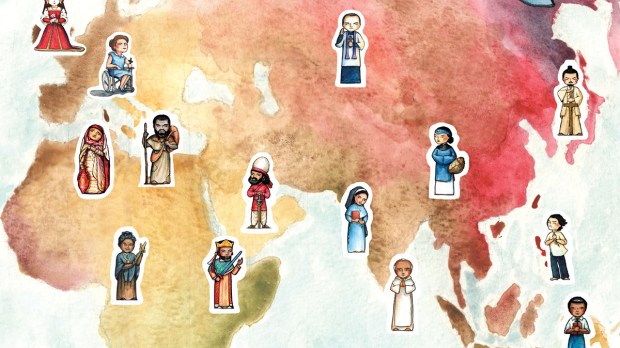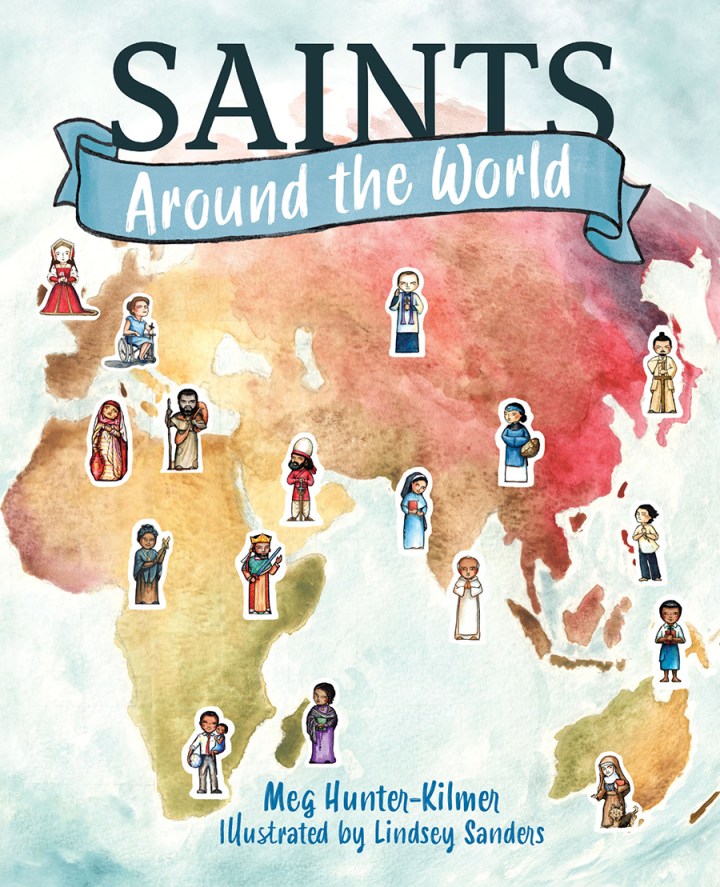Long-time regular Aleteia contributor Meg Hunter-Kilmer provides readers with lists of saints to call on in any situation — saints who were shy, and saints who weren’t. Saints who loved their in-laws, and saints who struggled with them. Saints who were athletes and saints who were failures. Saints whose lives were out of control.
Her writing at Aleteia shows us that, truly, anyone can be a saint, no matter our personal histories or struggles. Now she has released a children’s book, Saints Around the World, to make sure the Church’s young members grow up with that same message, from when they first start learning about their older brothers and sisters in Heaven. To get this beautiful book to more children, there is also a donation program.
We asked her to share with us a bit more about the book, and why she loves saints so much.
Aleteia: What makes this a unique compilation of saints?
Hunter-Kilmer: The purpose of this book was to show the universality of the Church–in terms of geographic spread (which is reflected in the map at the beginning of the book that shows how saints are from all over) and also in terms of race and disability and personality type and family situation. It’s the universal call to holiness, in charming stories and watercolor images.
We wanted readers to find saint after saint who spoke to different aspects of their lives, saints who looked like them in terms of facial features or limb differences or love of music or anger issues.
So there are lots of lesser-known saints and blesseds in this book, to highlight different joys and struggles that readers are living with. And because representation is so important, more than half of the saints in this book are Black, Indigenous, or people of color. As far as we can tell, it’s the first children’s saint book ever to showcase the diversity of the Church in this way.
Aleteia: The illustrations are really noteworthy as well. What were you and the illustrator aiming for?
Hunter-Kilmer: Lindsey Sanders, my illustrator, is one of my very best friends. Fortunately, she’s also a brilliant artist! She does a beautiful job creating images that are artistically lovely and also designed to appeal to children.
But more than that, she’s a fantastic researcher, working really hard to find the right clothes and colors and buildings and hand gestures and hair styles, to capture the spirit of each individual saint. Every element of her images is intentional and meticulously researched–so much so that I insisted we include notes explaining which ancient bust inspired a certain headdress or which building was featured or which color palette was a reference to an Indigenous type of lace.
But then there are also ducks and bikes and trains and babies and balls and horses to keep the attention of very young readers, who might not be ready to listen to the whole story but still really want to see the daddy holding his baby and a soccer ball (Bl. Benedict Daswa). And even that begins to build a relationship with that saint, and (through him) with Jesus.
Aleteia: You were very specific about word choice. Can you explain what you were trying to convey or avoid?
Hunter-Kilmer: One of the most exciting challenges of writing Saints Around the World was figuring out ways to tell hard stories without hurting the children who read them. I wanted every story to speak hope and joy to these kids, even if we were talking about difficult things. And I wanted a sense of excitement and wonder and adventure.
My hope was that these stories would be life-giving to everyone who read them, so I sent them to trauma-informed counselors and anti-racist activists and disability rights advocates to make sure that I was doing the best I possibly could to honor marginalized groups, to protect children’s tender hearts, to speak truth, and to call everyone deeper into the love of God.
That’s also why I left out the details of martyrdom. Some kids love that stuff! And some are traumatized by it. I wanted to err on the side of gentleness, even when not shying away from suffering and evil.
Aleteia: Can you share a bit about how you do your research?
Hunter-Kilmer: Honestly, I spend a lot of time on Google. But with many of these saints, there’s very little information available in English–or at all. I had to become rather adept at Googling in languages I don’t speak and then letting Google translate give me an approximation of what was being said.
The bigger issue than translation, though, was figuring out the meaning of these saints’ stories. I’d dig through heaps of biographies that listed dull facts while whitewashing out the struggle or the excitement, often reading one account after another until finally finding a story worth telling. Then I’d find other accounts to corroborate that story and build my narrative around it. St. Dulce Pontes, for example, is generally described as the Brazilian Mother Teresa, a nice lady who helped people. I must have read 15 articles about her before finding out that she once broke the window of a wrecked bus and dragged a dozen people out to safety before the bus burst into flames! Once I found that out, I knew just who Sr. Dulce was and the story flowed from there.
Aleteia: Why do you love saints so much?
Hunter-Kilmer: I’ve always been a storyteller. And when I finally discovered that the saints’ lives were fascinating, I realized that these stories really mattered, that when I told them well I gave people permission to seek holiness. I told them about people with addictions like them or mental illness like them, people who were divorced like them or disabled like them, who played soccer like them or rode horses like them. And as they listened, they began to believe that maybe God loved them the way he loved his saints. Maybe he made them on purpose, exactly as they were.
When we learn about the saints, the Spirit tells us that our brokenness isn’t an obstacle to God’s love, that we aren’t accidents or mistakes, but beloved sons and daughters made loud or quiet or dull or extraordinary or chronically ill or powerful or short or autistic or funny for a purpose. We don’t have to be less ourselves to be more Christ’s, and the wild diversity of the saints makes that clear every time we make a new heavenly friend.
~
Stay tuned to Meg’s work because in October, she’ll have a new release for adults: Pray for Us: 75 Saints Who Sinned, Struggled, and Suffered on Their Way to Holiness



